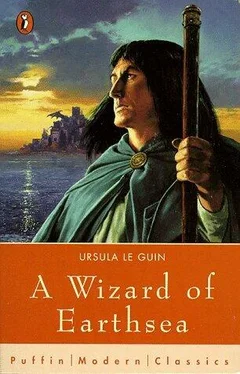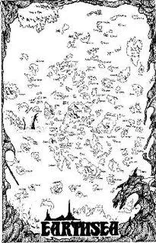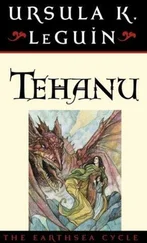Ursula Le Guin - A Wizard of Earthsea
Здесь есть возможность читать онлайн «Ursula Le Guin - A Wizard of Earthsea» весь текст электронной книги совершенно бесплатно (целиком полную версию без сокращений). В некоторых случаях можно слушать аудио, скачать через торрент в формате fb2 и присутствует краткое содержание. Жанр: Фэнтези, на английском языке. Описание произведения, (предисловие) а так же отзывы посетителей доступны на портале библиотеки ЛибКат.
- Название:A Wizard of Earthsea
- Автор:
- Жанр:
- Год:неизвестен
- ISBN:нет данных
- Рейтинг книги:5 / 5. Голосов: 1
-
Избранное:Добавить в избранное
- Отзывы:
-
Ваша оценка:
- 100
- 1
- 2
- 3
- 4
- 5
A Wizard of Earthsea: краткое содержание, описание и аннотация
Предлагаем к чтению аннотацию, описание, краткое содержание или предисловие (зависит от того, что написал сам автор книги «A Wizard of Earthsea»). Если вы не нашли необходимую информацию о книге — напишите в комментариях, мы постараемся отыскать её.
A Wizard of Earthsea — читать онлайн бесплатно полную книгу (весь текст) целиком
Ниже представлен текст книги, разбитый по страницам. Система сохранения места последней прочитанной страницы, позволяет с удобством читать онлайн бесплатно книгу «A Wizard of Earthsea», без необходимости каждый раз заново искать на чём Вы остановились. Поставьте закладку, и сможете в любой момент перейти на страницу, на которой закончили чтение.
Интервал:
Закладка:
A house was ready there for the township's new wizard. It stood on a hill among green fields of barley, sheltered from the west wind by a grove of pendick-trees that now were red with flowers. From the door one looked out on other thatched roofs and groves and gardens, and other islands with their roofs and fields and hills, and amongst them all the many bright winding channels of the sea. It was a poor house, windowless, with earthen floor, yet a better house than the one Ged was born in. The Isle-Men of Low Torning, standing in awe of the wizard from Roke, asked pardon for its humbleness. “We have no stone to build with,” said one, “We are none of us rich, though none starve,” said another, and a third, “It will be dry at least, for I saw to the thatching myself, Sir.” To Ged it was as good as any palace. He thanked the leaders of the township frankly, so that the eighteen of them went home, each in his own rowboat to his home isle, to tell the fishermen and housewives that the new wizard was a strange young grim fellow who spoke little, but he spoke fairly, and without pride.
There was little cause, perhaps, for pride in this first magistry of Ged's. Wizards trained on Roke went commonly to cities or castles, to serve high lords who held them in high honor. These fisherman of Low Torning in the usual way of things would have had among them no more than a witch or a plain sorcerer, to charm the fishing-nets and sing over new boats and cure beasts and men of their ailments. But in late years the old Dragon of Pendor had spawned: nine dragons, it was said, now laired in the ruined towers of the Sealords of Pendor, dragging their scaled bellies up and down the marble stairs and through the broken doorways there. Wanting food on that dead isle, they would be flying forth some year when they were grown and hunger came upon them. Already a flight of four had been seen over the southwest shores of Hosk, not alighting but spying out the sheepfolds, barns, and villages. The hunger of a dragon is slow to wake, but hard to sate. So the Isle-Men of Low Torning had sent to Roke begging for a wizard to protect their folk from what boded over the western horizon, and the Archmage had judged their fear well founded.
“There is no comfort in this place,” the Archmage had said to Ged on, the day he made him wizard, “no fame, no wealth, mybe no risk. Will you go?”
"I will go," Ged had replied, not from obedience only. Since the night on Roke Knoll his desire had turned as much against fame and display as once it had been set on them. Always now he doubted his strength and dreaded the trial of his power. Yet also the talk of dragons drew him with a great curiosity. In Gont there have been no dragons for many hundred years; and no dragon would ever fly within scent or sight or spell of Roke, so that there also they are a matter of tales and songs only, things sung of but not seen. Ged had learned all he could of dragons at the School, but it is one thing to read about dragons and another to meet them. The chance lay bright before him, and heartily he answered, "I will go "
The Archmage Gensher had nodded his head, but his look was somber. “Tell me,” he said at last, “do you fear to leave Roke? or are you eager to be gone?”
“Both, my lord.”
Again Gensher nodded. “I do not know if I do right to send you from your safety here,” he said very low. “I cannot see your way. It is all in darkness. And there is a power in the North, something that would destroy you, but what it is and where, whether in your past or on your forward way, I cannot tell: it is all shadowed. When the men from Low Torning came here, I thought at once of you, for it seemed a safe place and out of the way, where you might have time to gather your strength. But I do not know if any place is safe for you, or where your way goes. I do not want to send you out into the dark…”
It seemed a bright enough place to Ged at first, the house under the flowering trees. There he lived, and watched the western sky often, and kept his wizard's ear tuned for the sound of scaly wings. But no dragon came. Ged fished from his jetty, and tended his garden-patch. He spent whole days pondering a page or a line or a word in the Lore-Books he had brought from Roke, sitting out in the summer air under the pendick-trees, while the otak slept beside him or went hunting mice in the forests of grass and daisies. And he served the people of Low Torning as healall and weatherworker whenever they asked him. It did not enter his head that a wizard might be ashamed to perform such simple crafts, for he had been a witchchild among poorer folk than these. They, however, asked little of him, holding him in awe, partly because he was a wizard from the Isle of the Wise, and partly on account of his silence and his scarred face. There was that about him, young as he was, that made men uneasy with him.
Yet he found a friend, a boatmaker who dwelt on the next islet eastward. His name was Pechvarry. They had met first on his jetty, where Ged stopped to watch him stepping the mast of a little catboat. He had looked up at the wizard with a grin and said, “Here's a month's work nearly finished. I guess you might have done it in a minute with a word, eh, Sir?”
“I might,” said Ged, “but it would likely sink the next minute, unless I kept the spells up. But if you like…” He stopped.
“Well, Sir?”
“Well, that is a lovely little craft. She needs nothing. But if you like, I could set a binding-spell on her, to help keep her sound; or a finding-spell, to help bring her home from the sea.”
He spoke hesitantly, not wanting to offend the craftsman, but Pechvarry's face shone. “The little boat's for my son, Sir, and if you would lay such charms on her, it would be a mighty kindness and a friendly act.” And he climbed up onto the jetty to take Ged's hand then and there and thank him.
After that they came to work together often, Ged interweaving his spellcrafts with Pechvarry's handwork on the boats he built or repaired, and in return learning from Pechvarry how a boat was built, and also how a boat was handled without aid of magic: for this skill of plain sailing had been somewhat scanted on Roke. Often Ged and Pechvarry and his little son Ioeth went out into the channels and lagoons, sailing or rowing one boat or another, till Ged was a fair sailor, and the friendship between him and Pechvarry was a settled thing.
Along in late autumn the boatmaker's son fell sick. The mother sent for, the witchwoman of Tesk Isle, who was a good hand at healing, and all seemed well for a day or two. Then in the middle of a stormy night came Pechvarry hammering at Ged's door, begging him to come save the child. Ged ran down to the boat with him and they rowed in all haste through dark and rain to the boatmaker's house. There Ged saw the child on his pallet-bed, and the mother crouching silent beside him, and the witchwoman making a smoke of corly-root and singing the Nagian Chant, which was the best healing she had. But she whispered to Ged, “Lord Wizard, I think this fever is the redfever, and the child will die of it tonight”
When Ged knelt and put his hands on the child, he thought the same, and he drew back a moment. In the latter months of his own long sickness the Master Herbal had taught him much of the healer's lore, and the first lesson and the last of all that lore was this: Heal the wound and cure the illness, but let the dying spirit go.
The mother saw his movement and the meaning of it, and cried out aloud in despair. Pechvarry stooped down by her saying, “The Lord Sparrowhawk will save him, wife. No need to cry! He's here now. He can do it.”
Hearing the mother's wail, and seeing the trust Pechvarry had in him, Ged did not know how he could disappoint them. He mistrusted his own judgment, and thought perhaps the child might be saved, if the fever could be brought down. He said, “I'll do my best, Pechvarry.”
Читать дальшеИнтервал:
Закладка:
Похожие книги на «A Wizard of Earthsea»
Представляем Вашему вниманию похожие книги на «A Wizard of Earthsea» списком для выбора. Мы отобрали схожую по названию и смыслу литературу в надежде предоставить читателям больше вариантов отыскать новые, интересные, ещё непрочитанные произведения.
Обсуждение, отзывы о книге «A Wizard of Earthsea» и просто собственные мнения читателей. Оставьте ваши комментарии, напишите, что Вы думаете о произведении, его смысле или главных героях. Укажите что конкретно понравилось, а что нет, и почему Вы так считаете.










